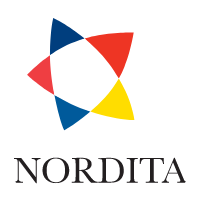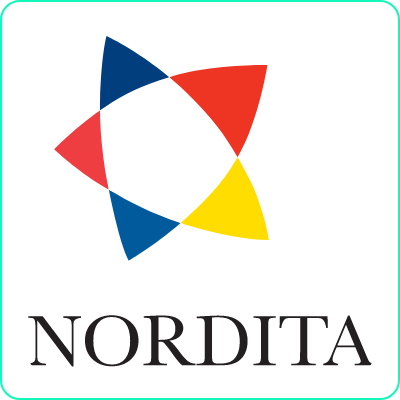Venue
Nordita, Stockholm, Sweden
Scope
The goal of this workshop is to gather researchers from the Stockholm and Helsinki areas, working in probability and mathematical physics.
Themes and preliminary program schedule
Thursday 28/11 | Lecture room 24, Albano Building 4, Floor 2
13.15 - 14.00: Tuomo Kuusi
14.10 - 14.55: Nathan Hayford
14.55 - 15.20: Coffee break and discussion
15.20 - 16.05: Osama Abuzaid
16.15 - 17.00: Yunxiang Liao
17.30: Reception with dinner
Friday 29/11 | Lecture room 31, Albano Building 4, Floor 2
09.15 - 10.00: Ellen Krusell
10.10 - 10.55: Alex Karrila
10.55 - 11.20: Coffee break and discussion
11.20 - 12.05: Daniel Ahlberg
12.15 - 13.00: Mikhail Basok
Invited speakers, titles and abstracts
Osama Abuzaid (Aalto University)
Title: Improving the topology in the large deviation principle for SLE variants
Abstract: Schramm-Loewner evolution (SLE) is a certain one parameter family of conformally invariant random curves SLE(k) (for k≥0), originally motivated by the study of scaling limits of interfaces in statistical lattice models. Large deviation principle (LDP) for SLEs gives quantitative estimates on the exponential convergence rate of SLE(k) to a deterministic curve in the limit k->0+. The specific estimates depend on the topology under which the LDP is formulated: finer topologies yields better estimates.
In this talk I will give a general step-by-step strategy to improve the topology in the LDP for SLEs, starting from Carathéodory topology for truncated SLEs and ending up with the topology of parameterized curves for the full SLEs. The strategy is demonstrated in the cases of chordal and radial SLEs. Finally I will argue how using chordal and radial LDPs one may be able to take shortcuts when proving LDP for other SLE variants in the topology of parametrized curves.
Daniel Ahlberg (Stockholm University)
Title: From stability to chaos in spatial growth models
Abstract: The notion of chaos was introduced by physicists in the 1980s to refer to the rapid decorrelation of a disordered system when exposed to a small perturbation. A framework for the study of small perturbations was introduced by Benjamini-Kalai-Schramm at the turn of the century, and a connection between anomalous fluctuation and a chaotic behaviour was discovered in later work of Chatterjee. In this talk we inform that in spatial growth models, such as first- and last-passage percolation, the order of perturbation at which the transition from stability to chaos occurs is determined by the fluctuations of the system.
Mikhail Basok (University of Helsinki)
Title: Random walk on planar graphs through the lens of t-embeddings
Abstract: t-embeddings are special embeddings of general planar graphs carrying the dimer model. These embeddings are designed to link the abstract notion of discrete holomorphicity appearing in the context of dimer model with the geometry of embeddings. In a series of works of Chelkak, Laslier and Russkikh, a regularity theory of discrete holomorphic functions on t-embeddings was developed; under some mild assumption discrete holomorphic functions were shown to satisfy some Holder type estimates, and their subsequential limits were proven to solve a certain conjugate Beltrami equation defined intrinsically in terms of the embedding. A key point of this regularity theory is a relation between discrete holomorphic functions on t-embeddings and harmonic functions on the so-called T-graphs: a large class of planar graphs introduced by Kenyon and Wilson that includes, in particular, Tutte's barycentric (harmonic) embeddings and square/rectangular tilings. In this talk we will address the question how the toolbox of t-embeddings can be used to analyze asymptotic properties of random walks on large T-graphs. In particular, we discuss how the properties of discrete holomorphic functions allow to describe the scaling limit of such random walks and to compare it with the Brownian motion.
Nathan Hayford (KTH)
Title: Critical phenomena in the 2-matrix model: the Ising model coupled to gravity
Abstract: The unitary invariant ensembles of random matrix theory (collectively referred to as the `1-matrix model’) are one of the central objects of study in the theory of random matrices. Upon tuning the parameters of this model, one can realize special critical phenomenon: objects such as correlation kernels the partition function under this tuning are expressible in terms of the Painlevé I and II hierarchies.
The 2-matrix model is an extension of the 1-matrix model, which came to be well-studied in part because it admits a much richer class of critical phenomena. In this talk, I will survey some of the conjectures regarding these critical phenomena from the physics literature, and discuss some of the physical implications of these results. In particular, I will discuss some forthcoming work (joint with Maurice Duits and Seung-Yeop Lee) regarding a special critical phenomenon in the 2-matrix model, which has implications in the theory of the Ising minimal model coupled to topological gravity.
Alex Karrila (Åbo Akademi)
Title: Planar UST Branches and c = -2 Degenerate Boundary Correlations
Abstract: The uniform random spanning tree (UST) on a finite subgraph of the integer lattice $\mathbb{Z}^2$ is an archetypal example of a critical discrete planar model, which are generally expected to exhibit conformal invariance in the scaling limit. Many such properties have also been proven over the past two decades, e.g., in terms of physics predictions from Conformal field theory (CFT), or purely mathematically in terms of conformally invariant random geometry.
In the present talk, we study connectivity events of multiple UST boundary branches, with potentially fused endpoints and in any topological connectivity. The scaling limits of their probabilities are found explicitly and shown to satisfy various properties of CFT (c=-2) degenerate correlation functions, in particular conformal covariance, fusion rules, and so-called BPZ PDEs. In CFT language, these limits are interpreted as covering the entire first row of the Kac table, hence providing arguably the widest rigorously known dictionary between a discrete model and a CFT. In the random geometry direction, we rigorously relate both the discrete model and the limiting probabilities to fused SLE ($\kappa$=2) type random curves.
Based on the joint work <https://arxiv.org/abs/2410.09800> with Augustin Lafay, Eveliina Peltola and Julien Roussillon.
Ellen Krusell (KTH)
Title: The ρ-Loewner energy: large deviations, minimizers, and alternative descriptions
Abstract: The chordal Loewner energy is a functional on chords in a simply connected domain of the complex plane. The original motivation for studying the Loewner energy came from (chordal) Schramm-Loewner evolution (SLE$_\kappa$), a family of conformally invariant random curves which arise as scaling limits of interfaces in critical lattice models: The Loewner energy is the large deviations rate function of SLE$_\kappa$ as $\kappa \to 0+$. Later on, it was discovered the Loewner energy has interesting ties to Teichmüller theory. This link was made by finding alternative descriptions of the Loewner energy in terms of Dirichlet energies of conformal maps and regularized determinants of Laplacians. These alternative formulas have also facilitated links between the Loewner energy and other objects, e.g., partition functions of Coulomb gas on Jordan curves and Brownian loop measure.
In this talk, I will present recent work in which I introduce and study the $\rho$-Loewner energy, a variant of the Loewner energy corresponding to the SLE$_\kappa(\rho)$ family (as $\kappa \to 0+$). In particular, I will present alternative formulas for the $\rho$-Loewner energy corresponding to those for the regular Loewner energy.
Tuomo Kuusi (University of Helsinki)
Title: Superdiffusion for Brownian motion with incompressible random drift
Abstract: I consider the long-time behavior of a diffusion process on~$\mathbb{R}^d$ advected by a stationary random vector field, which is assumed to be divergence-free, dihedrally symmetric in law, and have a log-correlated potential. A particular case is $\nabla^\perp$ of the Gaussian free field in two dimensions. We show that the system has quenched superdiffusive scaling. I will also discuss some recent and ongoing work on the theory of high-contrast homogenization. In the process, we have developed a renormalization procedure, which is expected to have applications in mathematical physics beyond this setting. This is a joint work with S. Armstrong and A. Bou-Rabee.
Yunxiang Liao (KTH)
Title: Random matrix theory in quantum thermalization
Abstract: Understanding thermalization in isolated quantum systems remains one of the most challenging unsolved problems in physics. The current theoretical framework for approaching this problem is the eigenstate thermalization hypothesis, which builds upon the random matrix theory (RMT). It is essentially a hypothesis about the statistical properties of energy eigenstates in the eigenbasis of physical observables, indicating the essential role of quantum chaos in thermalization. I will talk about the application of RMT in the thermalization of various Floquet random quantum circuit (RQC) models, focusing on the connection between relaxation behaviors and a special quantum chaos diagnostic – the spectral form factor. In particular, I will show fast relaxation in a family of RQCs that exhibit Wigner-Dyson energy level statistics, as well as a glassy, two-step relaxation in a special RQC, whose level statistics are neither Wigner-Dyson nor Poisson, but are instead analogous to those of the block Rosenzweig-Porter model.
Accommodation
Nordita has reserved a block of rooms at the following hotels:
-
Elite Hotel Arcadia | 10 rooms for single use - For details and reserving a room, click here. Last day to book your room is 30th of October.
-
Biz Apartment Gärdet | 10 Studio medium (for single or double use) - For reserving a room, contact at reservations@bizapartment.se. You can inform the hotel that you are making a reservation for the workshop by referring the code “NNMSFB”. Last day to book your room is 28th of October.
Nightly rate for studio medium - 1490 SEK/night incl. breakfast
-
All reservations, payments, date adjustments and/or cancellations are to be made by the interested participant directly with the hotels.
Please be aware that scammers sometimes approach participants claiming to be able to provide accommodation and asking for credit card details. Do not give this information to them! If you are in any doubt about the legitimacy of an approach, please get in contact with the organizers.
Application/Registration
The workshop is free and open for anybody to attend, but please fill in the registration form.
Sponsored by:


